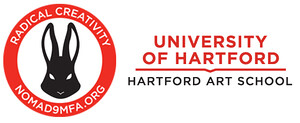200 Bloomfield Ave.
06117 West Hartford CT
How can a university provide a graduate education that is grounded in fieldwork, inspired by ecological principles, responsible to the challenges of these times, and committed to innovation in the service of ethical culture? The Interdisciplinary Master of Fine Arts program at the University of Hartford, commonly known as the Nomad/9 MFA, submits its field report from the Minnesota fall 2018 residency as a living investigation of these questions.
The fall MFA residency took place September 29–October 13, 2018. Students from North America, West Africa and the Middle East converged at The Water Bar & Public Studio in Minneapolis. Themes of inquiry included “doing the work of decolonization through engaging with Dakota educators at and around the Bdote”; “fostering community dialogue about the extraction economy in the Iron Range”; and “artists’ cross-sector partnerships in the Twin Cities.” The Nomad/9 MFA relates to place as teacher, with each residency activating a pedagogical investigation of history, ecology and interwoven cultures at sites in the Americas.
Ramona Kitto Stately (Santee Sioux Nation) and Ethan Neerdaehls (Bdewakantunwan Dakota) led a Bdote walk for students on the first day of the residency. Ramona Kitto Stately taught the Techno Lab course, teaching students how to make a beaded bag and using the text What this Awl Means: Feminist Archaeology at a Wahpeton Dakota Village by Janet D. Spector to reconsider how Dakota history in Minnesota has been approached within the academic research. Students visited the archives of the Science Museum of Minnesota with Dakota language and culture educator Ethan Neerdaehls to see examples of Dakota beading and quill work as they prepared to learn beading from Ramona Kitto Stately.
Amanda Lovelee taught the Art & Place, Reconsidered course, as a series of visits with artists who are working in cross-sector partnerships in the Twin Cities. A former St. Paul City Artist, Amanda Lovelee shared her experience as the Parks Ambassador for the Metropolitan Council and what it means to have artists serving in the city’s municipal infrastructure. Artists who presented their community engaged projects included Alyssa Baguss, Sean Connaughty, Aaron Dysart, Anna Metcalfe, Emily Stover, and Angie Tillges.
Shanai Matteson taught the Distinguished Practitioner course, “Overburden/Overlook: Mining, Material, Memory.” Students collaborated with her on the project Overburden/Overlook, which is being developed with Roopali Phadke, a social scientist who is studying the narratives surrounding newly proposed mines across the United States, and the relationship between minerals targeted for extraction, and the transition to a green energy future. A central question of the course was “What are the relationships between extraction, ecology, economy, and the futures we can (and cannot) yet imagine?” The students visited the Iron Range, where Shanai Matteson grew up, and contributed to a series of pedagogical objects and archive folders and files that are being used to stimulate community conversations across political divides in Northern Minnesota as part of the Overburden/Overlook project. Readings by Meridel LaSueur, Shawn Wilson, Claire Pentecost, Rebecca Solnit, and The Dark Mountain Project provided the conceptual framework for the course.
The residency concluded with critiques and dialogue led by Nomad/9 MFA thesis advisors Christy Gast and Mary Mattingly. Students presented their current work to the public in a Slide Slam, and they participated in three days of longform critiques and conversations with their advisors, including Program Director Carol Padberg.
Created in 2015, the Nomad/9 MFA program is a low-residency program offered by the University of Hartford’s Hartford Art School, with a high-impact curriculum that includes ecology, history and culture, and the craft-to-code technology continuum. The Nomad/9 MFA offers artists a revolutionary new way of engaging with their home community and other communities across the Americas, while preparing to address today’s most pressing cultural and social issues through their work. This singular MFA program is dedicated to regenerative culture and built for the 21st century with dynamic, cross-disciplinary, experiential coursework at sites throughout the Americas, including El Salvador; New York City; rural New Mexico, Oakland, CA; Miami, FL; and Minneapolis, MN. Applications for the incoming Cohort 4 are now available online at nomad9mfa.org, with a deadline for Scholarship Consideration of February 1, 2019.



